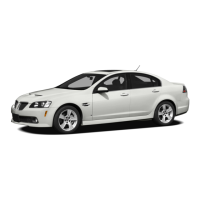Do you have a question about the Pontiac Solstice 2008 and is the answer not in the manual?
Details on manual and power seat adjustments, including seat height.
Explains proper use, importance, and safety precautions for all occupants.
Information on securing older children and infants in appropriate restraints.
Explains airbag operation, location, and safety precautions.
Guidance on checking and maintaining the vehicle's restraint systems.
Information about vehicle keys, transponders, and key tags.
Covers manual and power door locks, delayed locking, and automatic locking/unlocking features.
Details manual and power window operation, including express-down features.
Explains content theft-deterrent alarms and the PASS-Key® III+ system.
Guidance on new vehicle break-in, ignition positions, and starting procedures.
Instructions for adjusting rearview and outside mirrors, including power mirror controls.
Overview of OnStar services, features, and how the system works.
Information on accessing and using storage compartments like glove box and console.
Procedures for lowering and raising the manual convertible top.
Identifies main components of the instrument panel with a diagram.
Details operation of heating, ventilation, and air conditioning systems.
Explains the meaning and function of various dashboard warning lights and gauges.
Describes the layout and function of the vehicle's instrument cluster gauges.
Explains how to read the speedometer and odometer functions.
Describes the safety belt reminder light and chime system.
Explains the function of the airbag readiness light and related warnings.
Details the passenger airbag status indicator and its implications for child restraints.
Explains the charging system warning light and its meaning.
Describes the brake system warning light and its implications.
Explains the ABS warning light and what to do if it stays on.
Describes the ESC/TCS indicator light and its operational status messages.
Explains the engine coolant temperature warning light and overheating symptoms.
Details the low coolant warning light and potential overheating issues.
Explains the tire pressure light, its indicators, and the TPMS.
Describes the check engine light, its causes, and troubleshooting steps.
Explains the oil pressure light and what to do if it stays on.
Information regarding the vehicle's security system light.
Explains the reduced engine power light and its implications for performance.
Indicates when high-beam headlamps are in use.
Indicates if the trunk is not closed properly.
Explains the service vehicle soon light and when service is needed.
Details how to read the fuel gauge and common owner questions.
Explains the low fuel warning light and when it should go off.
Overview of the DIC, its displays, and personalization features.
Explains how to operate the DIC and navigate its displays.
Lists and explains various warning and status messages displayed by the DIC.
Information on programming personalization features via the DIC.
Introduces the vehicle's audio system and how to familiarize oneself with its features.
General advice on defensive driving, road awareness, and safety.
Warns against the dangers of drinking and driving, affecting reflexes and judgment.
Explains systems that help control the vehicle, like brakes, steering, and accelerator.
Covers perception and reaction time, stopping distances, and braking techniques.
Explains how ABS works to prevent braking skids and maintain steering control.
Provides guidance on emergency braking, steering, and using ABS.
Details how TCS limits wheel spin, especially in slippery conditions.
Describes how ESC helps maintain directional control using selective braking.
Covers power steering, steering tips, and handling curves safely.
Tips for safely passing other vehicles on a two-lane road.
Discusses what happens when control systems fail due to lack of friction.
Explains types of skids and how to handle them, including ABS and ESC.
Provides tips for safer driving during nighttime conditions.
Advice on driving in wet conditions, including hydroplaning and wet brakes.
Checklist of pre-trip vehicle checks and preparations.
Advice for driving on steep hills and mountain roads, including gear selection.
Tips for preparing the vehicle and driving safely in winter conditions.
Instructions for freeing a stuck vehicle, including using traction systems.
Importance of knowing vehicle capacity weight and avoiding overloading.
Information on towing your vehicle and recreational vehicle towing.
Information on obtaining genuine GM parts and service.
Discusses how non-dealer accessories can affect vehicle performance and safety.
Guidance on recommended fuel types, octane, and specifications.
General guidance on inspecting underhood components.
Instructions on how to open the vehicle's hood.
Identifies major components in the engine compartment.
Information on checking engine oil level and type.
Explains the engine oil life system and when to change oil.
Details on inspecting and replacing the engine air cleaner filter.
Information on transmission fluid and maintenance.
Explains engine coolant type, mixture, and system function.
Details on the coolant surge tank pressure cap and its importance.
Discusses causes and symptoms of engine overheating and actions to take.
Overview of the cooling system components and operation.
Instructions on checking and using power steering fluid.
Guidance on using and adding windshield washer fluid.
Information on brake fluid, brake wear, and pedal travel.
Step-by-step instructions for safely jump-starting the vehicle's battery.
Information on checking and using rear axle lubricant.
Guidance on headlamp aim adjustment and when to seek service.
Information on replacing various vehicle bulbs.
Discusses tire maintenance, wear, and dangerous conditions.
Information on low-profile tires and their susceptibility to damage.
Advice on using winter tires for improved traction in snow and ice.
Explains information found on tire sidewalls, including size and safety standards.
Details how to read tire size specifications.
Glossary of common tire-related terms and definitions.
Importance of correct tire pressure and consequences of under/over-inflation.
Explains the TPMS operation, sensors, and warning indicators.
Information on using the kit to temporarily seal punctured tires.
General advice on maintaining the vehicle's appearance.
Guidance on cleaning vehicle interior surfaces and materials.
Instructions for cleaning fabric and carpet interior surfaces.
Advice on cleaning and preserving leather interior surfaces.
Guidance for cleaning interior plastic and vinyl surfaces.
How to clean and maintain safety belts for proper function.
Best practices for washing the vehicle to preserve its finish.
How to clean windshields and wiper blades, and when to replace them.
Procedures for cleaning and protecting the convertible top.
How to clean and care for aluminum or chrome wheels and trim.
Information on the Vehicle Identification Number (VIN) and its locations.
Overview of the vehicle's electrical system, fuses, and circuit breakers.
Explains the function of fuses and circuit breakers and how to check them.
Lists various fluid capacities and key vehicle specifications.
Introduction to the maintenance schedule and its importance.
Necessary intervals, checks, parts, and fluids for vehicle maintenance.
Importance of proper maintenance for vehicle condition and environmental protection.
Guidance on how to use the maintenance schedule based on driving habits.
Details required services based on mileage and time intervals (Maintenance I/II).
Lists services to be performed at specific mileage intervals.
Provides detailed explanations and recommendations for various maintenance items.
Lists checks and services the owner can perform at different intervals.
Underhood checks to perform every time the vehicle is refueled.
Monthly checks, including tire inspection and inflation.
Annual checks, including starter switch inspection.
Lists recommended fluids and lubricants by name, part number, or specification.
Lists common replacement parts with GM and ACDelco part numbers.
Diagrams showing engine drive belt routing for different engine options.
Forms for logging vehicle maintenance history and services performed.
General information on customer assistance and the satisfaction procedure.
Steps for resolving concerns with dealership management and customer assistance.
Information on accessing vehicle information and services online.
Contact information for deaf, hard of hearing, or speech-impaired customers.
Contact details for Pontiac customer assistance centers in the US and Canada.
Details on reimbursement for adaptive equipment installation.
Information on covered services like fuel delivery, lock-out, and towing.
Guidance on scheduling warranty service appointments with a dealer.
Information on courtesy transportation options offered by dealers.
Advice on collision damage repair and choosing a qualified facility.
How to report safety defects to the US government and General Motors.
How to order service manuals and bulletins.
Explains vehicle data recording by onboard computers and privacy considerations.
Information about the EDR's purpose, data recorded, and GM's data usage policy.
Refers to OnStar services and terms and conditions for data collection.
Information on data storage and deletion for the navigation system.
Explains the use of RFID technology in vehicles for various functions.
| Brand | Pontiac |
|---|---|
| Model | Solstice 2008 |
| Category | Automobile |
| Language | English |












